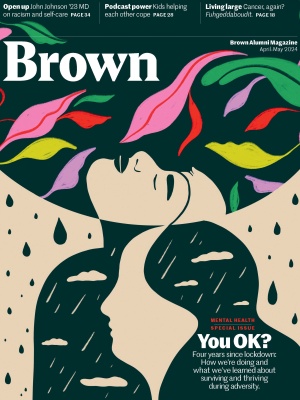Free Speech in Troubled Times
A letter from the President
Over the past several months, the Brown community has experienced tensions and division on campus as a result of the terrible violence in the Middle East—a conflict that has claimed far too many Palestinian and Israeli lives.
I have connected with hundreds of members of our community whose broad range of concerns, viewpoints, and experiences make our guiding principles clear: It is essential that our actions as a University community remain grounded in our mission of advancing knowledge and understanding within a caring and inclusive environment. Adhering to these values is especially important because of—not in spite of—the nature of a conflict that is deeply personal for so many, and the tensions and divisions it has created on campus.
One of these values of critical importance is Brown’s commitment to academic freedom and freedom of expression within an open and respectful learning community. For colleges and universities across the country, in recent months, challenges to academic freedom have intensified, and issues of freedom of expression on campus are at the forefront of these debates.
Brown’s strong Statement on Academic Freedom, which delineates the rights of faculty and students to free expression, has served us well for over 50 years. The statement says that, at Brown, faculty and students shall enjoy freedom of religious belief, speech, and press; the right to association and assembly and political activity inside and outside of the classroom; and the right to petition the authorities, the public, and the University.
Furthermore, faculty and recognized student groups have the right to invite speakers of their choice to campus. There are guardrails on time, place, and manner that ensure that protests don’t infringe on the academic freedom of others or interfere with the normal functions of the University, including teaching and research. And, of course, speech that crosses the line into harassment based on religion, nationality, race, ethnicity, or other characteristics is completely unacceptable.
In times of conflict, I am often asked by members of our community to make public statements to address these situations for a variety of reasons. I occasionally engage in public advocacy on policy issues only when these issues are directly related to the mission of higher education and Brown, such as legislation affecting financial aid, or Deferred Action on Childhood Arrivals. Outside of these circumstances, it is precisely because of Brown’s commitment to academic freedom that I will not make public statements on these issues as doing so would undermine a commitment that is the bedrock of our teaching and learning community.
A university is not a single person, but a community of people who hold diverse views. My responsibility as president is not to place a stamp of approval on the views of a subset of the community, even if that subset is large. Rather, my responsibility is to ensure that individual members of the community are free to voice their views, including using their voices to urge lawmakers and corporations to take specific actions or, more generally, express their beliefs on matters of conscience. These are the rights that freedom of expression guarantees.
Throughout the Spring 2024 semester, we are taking important steps to safeguard freedom of expression and the open exchange of ideas. The Provost’s Office, the Faculty Executive Committee, and academic units across campus are engaging our campus in discussions about the fundamental principle of academic freedom and its meaning and implications, including what this means during times of intense conflict. These efforts include hosting lectures, seminars, panels, and discussions about the principle of academic freedom and the ongoing debates it inspires on college campuses and beyond.
It is my hope that these efforts help us to continue to cultivate an environment in which we as a teaching and learning community can discuss issues that prompt vigorous debate from different viewpoints in constructive and engaging ways. In doing so, we will develop opportunities as an educational community to identify impactful ways to encourage the open debate required to build understanding and for new knowledge to flourish.
Read the April–May President’s Spread on the “Transforming Career Support” here (PDF).





